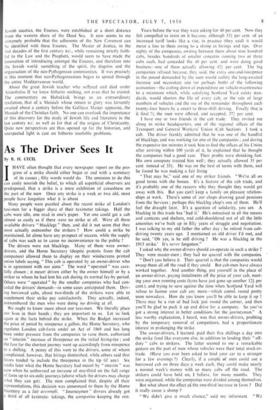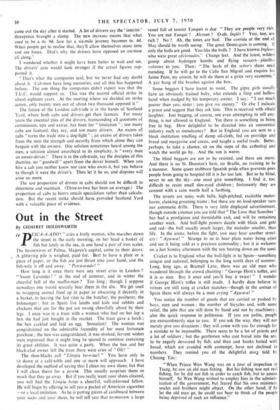As The Driver Sees It
ByR. H. CECIL
IHAVE often thought that every newspaper report on the pro- gress of a strike should either begin or end with a summary of its causes ;, fifty words would do. The omission to do this can easily .nourish the belief, to which all superficial observers are predisposed, that a strike is a mere exhibition of cussedness on the part of the men Once any strike is a week or two old, most
people have forgotten what it is about. , Many people were puzzled about the recent strike of London's taxi-men for a bigger share of their taximeter takings. Half the cabs were idle, one read in one's paper. Yet one could get a cab almost as easily as if there were no strike at all. Were all these available drivers " blacklegs " then, and did it not seem that they must actually outnumber the strikers ? How could a strike be maintained, let alone have any prospect of success, while the supply of cabs was such as to cause no inconvenience to the public ?
The drivers were not blacklegs. Many of them were owner- drivers, and the Home Secretary (despite protests from the cab companies) allowed them to display on their windscreens printed union labels saying, " This cab is operated by an owner-driver who is in agreement with our aims." The word " operated " was care- fully chosen ; it meant driven either by the owner himself or by a striker to whom he had lent his cab during its normal lay-by period. Others were " operated " by the smaller companies who had con- ceded the driVers' demands—in some cases anticipated them. Driv- ing borrowed cabs, about two-thirds of the strikers were able td supplement their strike pay satisfactorily. They actually, indeed, outnumbered the men who were doing no driving at all.
We ought to know more about our taxi-men. We literally place our lives in their hands ; they are important to us. Let us look again at the facts behind the strike. When the Budget increased the price of petrol by ninepence a sgallon, the Home Secretary, who regulates London cab-fares under an Act of 1869 and has long been under pressure from the companies to raise them, authorised an " interim " increase of threepence on the initial hiring-fee ; and the fare for the shortest journey went up accordingly from ninepence to a shilling. A penny of this went to the drivers, some of whom complained, however, that hirings diminished, while others said that hirers tended to include the threepence in the tip (if any). Six weeks later what the Home Secretary had meant by " interim " was seen when he authorised an increase of one-third on the full range of fares up to six-mile journeys (above which the drivers may charge what they can get). The men complained that, despite all their representations, this decisidtt was announced to them by the Home Secretary as a fait accompli. " Journeymen" drivers already got a third of all taximeter takings, the companies -keeping the rest.
Years before the war they were asking for 40 per cent. Now they felt compelled to insist on it because, although 33+ per cent. of an increased tariff looks like a rise, in practice (they said) it would mean a loss to them owing to a slump in hirings and tips. Over eighty of the companies, owning between them about nine hundred cabs, besides hundreds of smaller concerns running two or three
cabs each, had conceded the 40 per cent. and were doing good business—one of them actually allowing 42-1 per cent. The big
companies refused because, they said, the extra one-and-fourpence in the pound demanded by the men would nullify the long-awaited increase and necessitate one (or perhaps both) of the following economies—the cutting down of expenditure on vehicle-maintenance to a minimum which, while satisfying Scotland Yard safety stan- dards, would shorten the life of every cab, or the sale of large numbers of vehicles and the use of the remainder throughout each twenty-four hours by a resort to three-shift driving. Finally (but is it final ?), the men were offered, and accepted, 371 per cent.
I have one or two friends in the cab trade. They invited me along to strike headquarters, one of the regional offices of the Transport and General Workers' Union (Cab Section). I took a cab. The driver frankly admitted that he was one of the handful of blacklegs, and was working for one of the companies ; and during the expensive ten minutes it took him to find the offices of his Union after arriving within 100 yards of it, he explained that he thought the companies had a good case. Their profits were shrinking fast.
His own company treated him well ; they actually allowed 35 per cent. instead of 331. He was on the best of terms with them, and he found he was making a fair living " That may be," said one of my striker friends. " We're all on good terms with the bosses. It's a feature of the cab trade, and it's probably one of the reasons why they thought they would get away with this. But you can't keep a family on pleasant relation- ships at work. There's some of our chaps drawing good pensions from the Services ; perhaps this blackleg chap's one of them. He'll feel the draught later. It's a question of solidarity, you see. A blackleg in this trade has had it.' He's ostracised in all the messes
and canteens and shelters, and cold-shouldered out of all the little
amenities we've built up in fifty years of struggle and negotiation. I was talking to my old father the other day ; he retired from cab-
driving twenty years ago. I mentioned an old driver I'd met, and he said, Oh yes, is he still driving ? He was a blackleg in the 1913 strike.' It's never forgotten."
I asked why the owner-drivers should co-operate in such a strike ? They were master-men ; they had no quarrel with the companies.
" Don't you believe it. Their quarrel is that the companies would sweep them all off the road if they could. But cab-men have always worked together. And another thing, put yourself in the place of an owner-driver, paying instalments off the price of your cab, meet- ing your own running costs (tyres have just gone up another 12+ per cent.), and trying to save against the time when Scotland Yard will refuse to license your cab any more—which comes round pretty soon nowadays. How do you know you'll be able to keep it up ?
There may be a run of bad luck just round the corner, and then you'll be glad to pack it up and drive for a company. So you've got a strong interest in better conditions for the journeyman." A less worthy explanation, I heard, was that owner-drivers, profiting by the temporary removal of competitors, had a proportionate interest in prolonging the strike.
The owner-drivers, I learned. paid their five shillings a day into the strike fund like everyone else, in addition to lending their " off- duty " cabs to strikers. The latter seemed to me a remarkable gesture on the part of men whose vehicles were their total stock-in- trade. (Have you ever been asked to lend your car to a stranger
for a few evenings ?) Clearly, if a couple of men could use a
borrowed cab on three days a week each, they could make nearly a normal week's money with so many cabs off the road. The strikers could have held on, I believe, for many months. They were organised, while the companies were divided among themselves. But what about the effect of-the one-third increase in fares ? Did it really cause a slump ?
" We didn't give it much chance." said my informant. " We came out the day after it started. A lot of drivers say the ' interim' threepence brought a slump. The new increase means that what used to be a 4s. 9d. fare for a six-mile journey becomes 6s. 4d. When people get to realise that, they'll allow themselves more time and use buses. That's why the drivers have opposed an increase all along."
I wondered whether it might have been better to wait and see. The drivers' case would look stronger if the actual figures sup- ported it.
"That's what the companies said, but we never had any doubt about it. Cab-men have long memories, and all this has happened before. The one thing the companies didn't expect was that the T.U.C. would support us. This was the second official strike in about eighteen years. At the meeting where we decided on strike action, only twenty men out of about two thousand opposed it."
The future of the London cab-trade is in the hands of Scotland Yard, where both cabs and drivers get their licences. For many years the essential plea of the drivers, transcending all questions of commission, tips and extras, has been for " limitation " ; too many cabs are licensed, they say, and too many drivers. An excess of cabs " turns the trade into a dog-fight " ; an excess of drivers takes from the men the strength and security from which alone they can bargain with the owners. One solution sometimes heard among the men, a solution almost anarchical in its simplicity, is " every man an owner-driver." There is in the cab-trade, say the disciples of this doctrine, no " goodwill " apart from the driver himself. When you hire a cab you neither know nor care who owns it, but you behave as though it were the driver's. Then let it be so, and disputes will arise no more.
The lust proportion of drivers to cabs should not be difficult to determine and maintain. (Three-to-two has been an average.) The proportion of cabs to hirers entails speculation rather than calcula- tion. But the recent strike should have- provided Scotland Yard with a valuable piece of evidence.







































 Previous page
Previous page